
The Phoney War (or Sitzkrieg) refers to the initial months of World War 2, marked by a notable absence of significant land and air operations between the Allies and Germany. This period of inactivity was partly due to the traumatic losses France and Britain had suffered during the Great War (World War I), which were still fresh in the minds of many. Instead of launching an immediate offensive, they chose to adopt a defensive strategy to build up their forces and fortify their positions in preparation for the inevitable German offensive. This period of calm ended abruptly in April 1940 when Germany invaded Denmark and Norway, followed soon after in May by its long-awaited offensive in the west, when it unleashed the full power of blitzkrieg through neutral Belgium, Holland, and Luxembourg in order to bypass the Maginot Line of fortifications along the Franco-German border.
September 1939
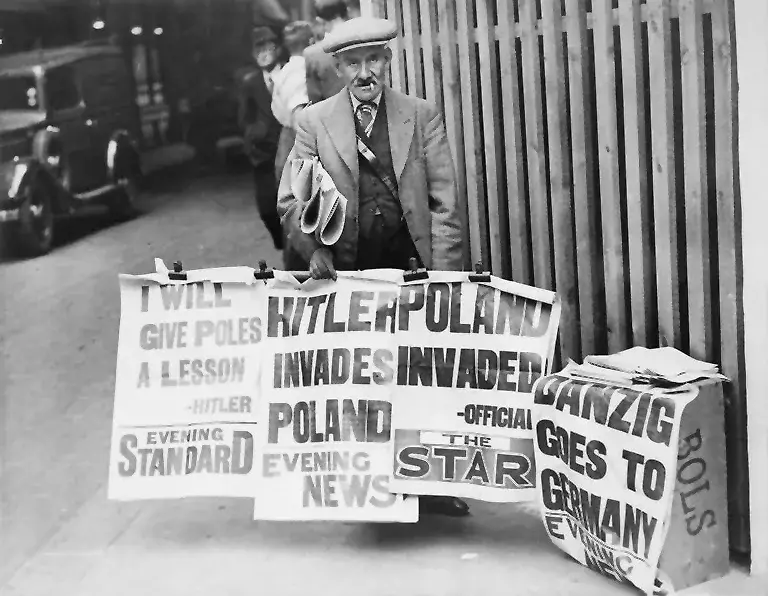
British newspapers on the 1st September displaying the news that Germany has invaded Poland.
3rd September 1939
Following a long period of political isolation, Winston Churchill is appointed by Neville Chamberlain as First Lord of the Admiralty, putting him in charge of the Royal Navy. The RAF conducts its first propaganda air raid of the war, during which its bombers drop around six million pamphlets over northern Germany, which are designed to inform the German population about the reasons for Britain's entering the war and to encourage dissent against the Nazi regime.
4th September 1939
The first major engagement between the Luftwaffe and the RAF occurs over the North Sea when 29 RAF bombers attempt to attack the German naval base at Wilhelmshaven. The Luftwaffe intercepts them with only eight aircraft managing to find and attack the target. Seven British aircraft are shot down during the operation. Spain's General Francisco Franco offers his country's support to Germany while publicly declaring neutrality.
5th September 1939
President Roosevelt signs a proclamation declaring the neutrality of the United States.
6th September 1939
South African Prime Minister Jan Christiaan Smuts, declares war on Germany. The British Expeditionary Force begins to transfer combat units across the channel to France.
8th September 1939
President Franklin Roosevelt advocates for strengthening the U.S. military, utilizing his constitutional authority to call up the reserves, in response to a state of "limited national emergency" created by the war in Europe.
10th September 1939
Following Parliamentary debate, Canada follows Britain and France and declares war on Germany. However, Canada is unprepared for a war having just 4,500 regular soldiers and 51,000 reservists, with almost no modern equipment, few aircraft a just 6 destroyers in its navy.
21st September 1939
Pro-Nazi Iron Guardsmen assassinate Romanian Prime Minister Armand Calinescu amid suspicions that he is plotting to sabotage Romanian oil fields to prevent them from falling into German hands.
22nd September 1939
The British government introduces petrol rationing to ensure that essential services and military operations have adequate fuel supplies.
23rd September 1939
The German government announces that all radio sets owned by Jews are to be confiscated.
25th September 1939
Germany introduces the rationing of bread and flour in an effort to manage food supplies and ensure there is enough for both the military and civilian population.
27th September 1939
Hitler, summoning the Wehrmacht's leading generals to a meeting in Berlin, informs them of his intention to invade France and discusses with them the required logistics and timings of the operation.
October 1939
6th October 1939
Adolf Hitler, speaking to the Reichstag in Berlin, asserts that Germany harbours no territorial ambitions towards England, France, and several other nations. He proposes an end to hostilities and peace, following the completion of the occupation of Poland by Germany and the Soviet Union.
9th October 1939
Adolf Hitler issues Directive No. 6, outlining plans for the offensive in the West, codenamed "Operation Fall Gelb" (Case Yellow). Similar to the Schlieffen Plan used in World War 1, the offensive would involve the mass of the German Army rapidly wheeling through Belgium and Luxembourg to outflank the Maginot Line defences along the Franco-German border. However, unlike the Schlieffen Plan, Holland would also be invaded. The start date was provisionally set for the 12th November 1939.
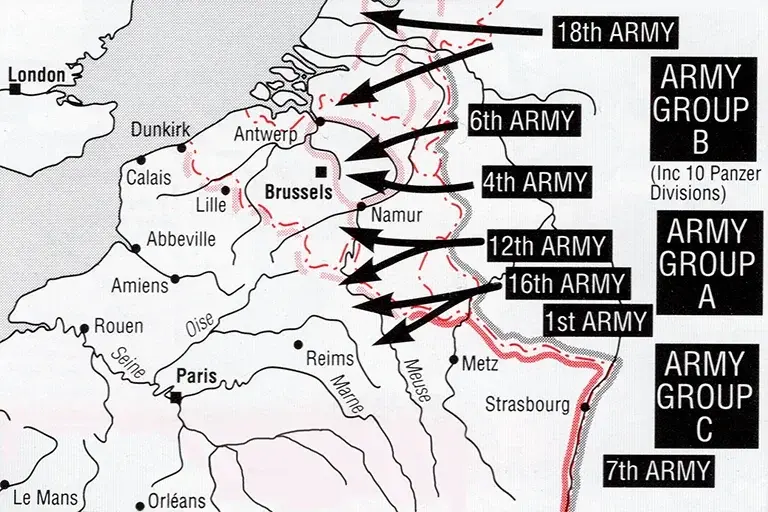
Plan 'Fall Gelb' (Case Yellow) was Hitler's approved strategy for the invasion of France and the Low Countries, formalized in October 1939.
12th October 1939
Britain and France dismiss Hitler's recent peace proposals as insincere. British Prime Minister Neville Chamberlain emphasizes this by stating, "no reliance can be placed upon the promises of the present German government."
Neville Chamberlain
Prime Minister of the United Kingdom
October 1939
"We have to kill one another just to satisfy that accursed madman."
30th October 1939
President Roosevelt delivers a radio broadcast, urging Congress to amend the Neutrality Act and allow the sale of arms to the allied nations on a 'cash-and-carry' basis. This change would mean that as long as the Allies pay in cash and transport the weapons in its own ships, then they can purchase arms from the U.S.
November 1939
1st November 1939
The U.S. Senate votes to amend the Neutrality Act with the 'cash-and-carry' amendment, marking a significant step towards the final passage of the bill.
3rd November 1939
Following the Senate's approval, the House of Representatives also votes in favour of the amended Neutrality Act.
4th November 1939
An anonymous person, later identified as Hans Ferdinand Mayer, leaves a report about secret German weapons research on the windowsill of the British Embassy in Oslo. Known as the 'Oslo Report', it includes critical information on the development of radar technology, the V-2 rocket program, and other top secret weapons projects. The report is signed off from "a German scientist who wishes you well" and left along with a mine fuse as proof of its authenticity. With the U.S. Congress having passed the amended Neutrality Act, President Franklin D. Roosevelt signs it into law. This marks a major shift in U.S. foreign policy by allowing the country to support the Allies by selling weapons, whilst maintaining a stance of non-involvement in direct combat.
7th November 1939
Emphasizing their countries' neutrality and hoping to avert further conflict, the Belgian and Dutch monarchs jointly offer to mediate peace negotiations between Germany and the Allies. However, both sides rejected their offer, as well as a similar one made by King Carol of Romania.
8th November 1939
A bomb planted in Munich's Bürgerbräukeller by Johann Georg Elser, a carpenter opposed to the Nazi regime, explodes during the celebration of the 16th anniversary of Hitler's Beer Hall Putsch. It narrowly misses its target, with Hitler having left the celebration 13 minutes earlier. The explosion results in the deaths of eight people with injuries to several others. Elser is arrested later that night whilst trying to cross the border into Switzerland. He will eventually be executed on Hitler's orders at Dachau concentration camp on the 9th April 1945.
12th November 1939
"Operation Fall Gelb" (Case Yellow), the invasion of France and the Low Countries, is postponed by Hitler until January 1940 due to logistical issues and poor weather conditions.
17th November 1939
In what would become known as Plan 'D' or the Dyle Plan, the Allies agree that their forces will move into Belgium to meet the anticipated German attack. The plan called for them to move quickly to take up defensive positions behind the Albert Canal and the Rivers Dyle and Meuse, which would provide a significant natural defensive position and give them a good chance of holding the Germans.
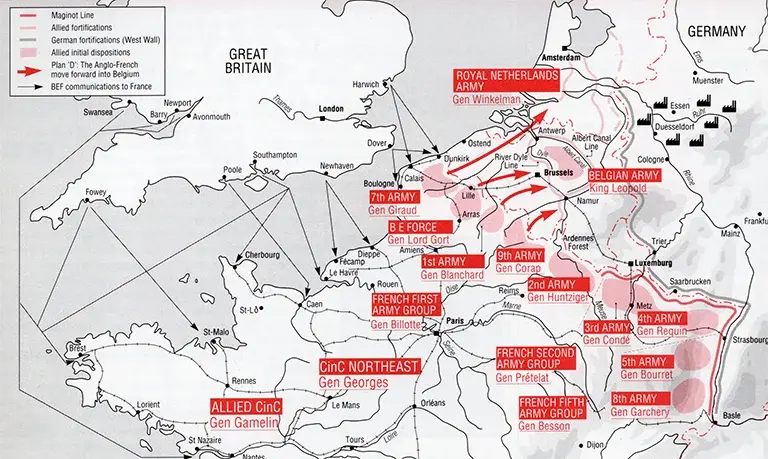
Plan 'D' outlining the movements to be made by the Allied armies into Belgium in response to a German attack.
December 1939
7th December 1939
Not yet ready to enter the war, Mussolini reaffirms Italy's neutrality.
14th December 1939
Organized by Alfred Rosenberg, the Nazi Party's chief racial theorist, the Norwegian politician Vidkun Quisling meets with Adolf Hitler in Berlin that evening. He urges Germany to launch a pre-emptive invasion of Norway to forestall a British occupation and establish a pro-German government led by himself, which he claimed would have significant support from the Norwegian population. Following the meeting, Hitler, understanding the strategic and economic value of controlling Norway's ports and coastline, and the protection it would offer to Swedish iron-ore shipments to Germany, orders that a plan for the invasion of Denmark and Norway be prepared. Known as Operation Weserübung, it is to be launched in the spring prior to the attack on France and the Low Countries.
15th December 1939
The British 5th Infantry Division arrives in France to join the British Expeditionary Forces (BEF) already stationed near the Belgian border.
23rd December 1939
A Pan-American Conference starts in Panama, where Latin American countries discuss the threats to their neutrality due to the ongoing conflict in Europe. The aim is to establish a collective stance to protect their interests and maintain peace in the region. Following this, Argentina, Brazil, and others issue statements reaffirming their commitment to neutrality and condemning any actions that could drag them into the conflict.
24th December 1939
Pope Pius XII makes a heartfelt Christmas Eve appeal for peace.
25th December 1939
Adolf Hitler visits German troops stationed on the Western Front, reviewing their readiness and morale.
January 1940
10th January 1940
Adolf Hitler informs his military commanders that the planned German offensive in the west, known as Operation Fall Gelb (Case Yellow), will commence on the 17th January. Meanwhile, a German aircraft flown by Major Erich Hoenmanns, flying between Loddenheide and Cologne, strays across the border into neutral Belgium after becoming lost in heavy fog. The plane developing engine trouble, is forced to land near Vuchts at 11:30 am. On board is Major Helmuth Reinberger, senior supply officer for the 7th Flieger Division, who is carrying secret documents concerning his division's role in the planned attack in the west. In what would become known as the 'Mechelen Incident', Major Reinberger, realizing they have landed in Belgium, tries to burn the secret documents but is only partially successful before being discovered and taken prisoner by two Belgian border guards investigating the plane crash. The partially burnt papers are handed over to Belgian intelligence. Later that evening, news of the incident reaches the German High Command in Berlin through press reports of a crashed German plane in Belgium. This causes a degree of panic, when it's discovered that Major Reinberger was onboard and must have had papers revealing parts of the attack plan with him.
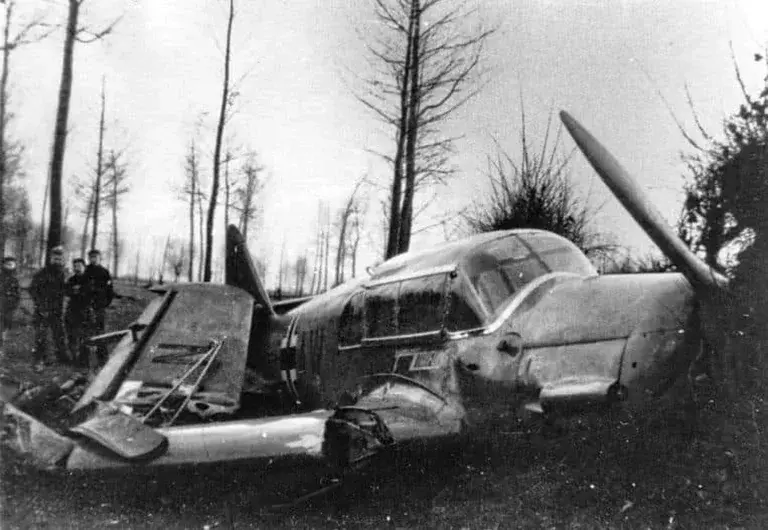
The wreck of the Messerschmitt Bf 108 Taifun, which was carrying Major Helmuth Reinberger and the plans for Operation Fall Gelb, in a field near Vuchts.
11th January 1940
An enraged Hitler, informed of the captured plans for the attack on the west, fires both the commander of Luftflotte 2, General Felmy, and Felmy's chief of staff, Colonel Kammhuber. Nevertheless, he agrees to proceed with the attack as originally planned, whilst the Luftwaffe attache in Holland and the military attache in Belgium investigate if the plan had been fatally compromised. That afternoon, King Leopold III of Belgium informs the French supreme commander Maurice Gamelin of the German plans to attack, and a two-page abstract of the contents was forwarded at 17:15. Lord Gort, the commander of the British Expeditionary Force is also warned, along with the Dutch and Luxembourg heads of state. He told the former, "Be careful, the weather is dangerous," and the latter, "Beware of the flu," both predetermined code phrases indicating the Belgians considered a German attack to be imminent.
12th January 1940
The German military attache in Belgium is allowed to meet with Major Reinberger and reports back to General Jodl, the Wehrmacht's Chief of Operations. Jodl gives Hitler a worrying assessment of what the Belgians might have learned, stating, "If the enemy is in possession of all the files, then the situation is catastrophic!" However, the Germans were falsely reassured by Belgian deception measures that had tricked Reinberger into believing he had indeed destroyed the secret plans. Whilst most of the documents had been badly damaged by Reinberger's attempts to burn them, the general outlines of an attack involving the 7th Flieger Division against Belgium and the Netherlands was still clear from the remaining pages, although the date of the attack was not mentioned. Gamelin holds a meeting with his army commanders to discuss the Belgian warning of an impending attack. His Chief of Military Intelligence, Colonel Rivet, is skeptical of the claims. However, Gamelin considered that, even if it were a false alarm, this would be an excellent opportunity to 'encourage' Belgium to side with France and Britain and allow French and British units to advance into Belgium to take up their pre-planned defensive positions ahead of any German attack. He therefore ordered the 1st Army Group and the adjoining 2nd Army Group's Third Army to move up to the Belgian frontier in readiness.
13th January 1940
With the captured German plans to invade France through Belgium and Holland in their hands, Belgium initiates a mobilization of its forces. Due to the urgency, this was done by broadcasting a message via a radio program at 22:30, ordering the immediate recall of all 80,000 Belgian soldiers currently on leave from their units. This operation, known as "Phase D," would ensure that their forces were at full strength when the Germans attacked.
15th January 1940
With French and British units ready at the Belgian border, requests by them to be able to move their troops into Belgium ahead of any German attack are denied.
16th January 1940
Adolf Hitler orders the postponement of Operation Fall Gelb (Case Yellow) until the spring. This decision is primarily influenced by the capture of Major Reinberger and the operational plans he was carrying by Belgium on the 10th January. The Germans were now convinced that the plan is compromised, having become aware of the military preparations being taken by Belgium and the Western Allies over the last few days. There were also strong calls from the German generals to delay due to the difficult winter conditions, which would make a rapid advance more difficult.
30th January 1940
In a speech delivered to the Nazi Party faithful at the Berlin Sportpalast, marking the seventh anniversary of his assumption of power, Adolf Hitler declares that the first phase of the war is complete with the destruction of Poland and that the second phase might be "a war of bombs."
February 1940
4th February 1940
The members of the Balkan Entente - Romania, Yugoslavia, Greece, and Turkey - declare their neutrality.
11th February 1940
The German-Soviet Trade Agreement is signed in Moscow, committing the Soviet Union to supply 430 million Reichsmarks' worth of oil, grain, and other raw materials. In return, Germany will supply manufactured goods, military equipment, machinery, and technology.
16th February 1940
In response to the potential threat from air raids, plans are announced to evacuate up to 400,000 children from British cities to more secure rural areas to ensure their safety.
18th February 1940
With the original plans for the invasion of France compromised, Hitler orders that Manstein's strategy be used as the basis for the offensive instead, as this offers the best possibility of a decisive victory. Manstein envisioned an operation where the bulk of the Panzer Divisions would move through the Ardennes to Sedan and then swiftly advance to the English Channel, encircling the bulk of the Allied armies in Belgium.
24th February 1940
Germany, following extensive strategic planning and coordination, finalizes its plans for the invasion of Western Europe.
March 1940
1st March 1940
As part of a special mission to Europe on behalf of President Franklin D. Roosevelt, U.S. Under Secretary of State Sumner Welles arrives in Berlin after his recent visit to Rome. His aim was to broker peace between the belligerent nations.
3rd March 1940
Having met with Hitler, Sumner Welles leaves Berlin for Paris, then London. Nothing significant is agreed upon, as the German Führer is convinced that his mission's aim is to drive a wedge between Germany and Italy.
6th March 1940
At a military conference in Berlin, Hitler confirms his acceptance of the plan put forward by Gerd von Rundstedt and his former chief of staff, Erich von Manstein, for the Ardennes option. Code-named Fall Sichelschnitt (Plan 'Sickle'), this strategy involves attacking through the Netherlands and Belgium as originally envisaged, but with fewer forces in order to draw the Allies forward. Meanwhile, a decisive thrust would be made through the Ardennes behind them trapping the bulk of the Allied Army in a pocket. Holding attacks would be made against the Maginot Line. The date is for the offensive to begin is set for the 5th May.
18th March 1940
In a meeting presented to the world as a discussion to maintain peace in Europe, Hitler and Mussolini, along with their foreign ministers Ribbentrop and Ciano, meet for about two hours at the Brenner Pass on the Austro-Italian border. The main purpose of the meeting was to secure Italy's agreement to enter the war, which Mussolini granted, though without committing to a specific date. Nevertheless, this further solidified the Axis alliance.
20th March 1940
A new French government is established with Paul Reynaud replacing Edouard Daladier as Prime Minister. Daladier, criticized for his policy of appeasement towards Germany, steps aside for Reynaud, who was known for his strong opposition to Nazi Germany.
28th March 1940
Britain and France, in a show of solidarity, pledge not to negotiate or conclude any peace agreements separately, agreeing that any terms of peace will be mutually agreed upon by both nations.
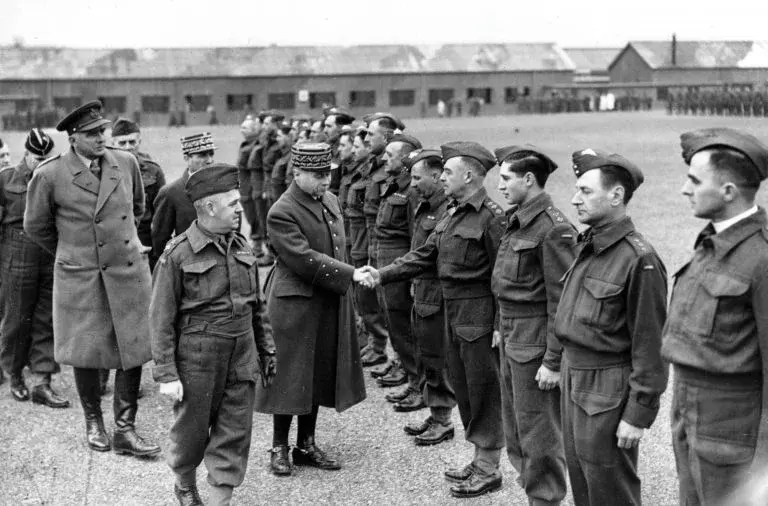
Inspection of British troops at a training camp in England by French General Maurice Gamelin during the spring of 1940.
April 1940
4th April 1940
In a confident statement, British Prime Minister Neville Chamberlain announces to conservative party colleagues at the annual National conference that Hitler due to his failure to act decisively and quickly has "missed the bus", and that the delay has allowed the British and French forces to enormously increase in strength.
Neville Chamberlain
Prime Minister of the United Kingdom
4th April 1940
"Whatever reason Hitler had for not making an immediate endeavour to overwhelm us, one thing is certain - he has missed the bus... Those seven months delay have enabled us to remove weaknesses and so enormously add to our fighting strength that the future can be faced with a calm mind"
22nd April 1940
The Allied Supreme War Council convenes in Paris with representatives from Poland and Norway in attendance. They reach an agreement to prioritize the defense of Narvik and Trondheim to support Norway. Additionally, the Allies agree that if Germany invades Belgium or Holland, the RAF will bomb the Ruhr.
May 1940
3rd May 1940
With Operation Fall Gelb (Case Yellow), the offensive in the West due to begin on the 5th May, Hitler delays the start (X-Day) until the 6th May due to poor weather conditions.
5th May 1940
Due to continued bad weather conditions, Hitler again delays X-Day and the start of the offensive in the West, this time to the 8th May.
7th May 1940
Once again Hitler delays X-Day, this time to the 10th May. Bad weather is still a factor, but he is also struggling with a political justification for the attack on neutral Holland, Belgium and Luxembourg. Believing a German invasion is imminent, the Dutch government suspends all army leave and orders frontier and coastal troops to fully man their fighting positions.
9th May 1940
Belgium declares a state of emergency and places its military on high alert in anticipation of a German invasion. With the Dutch and Belgians now fully aware of what is coming and mobilizing their forces, Hitler confirms that X-day for Operation Fall Gelb (Case Yellow) will begin at 5:35 AM the next morning.
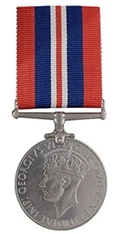
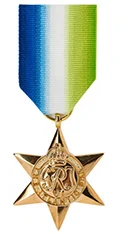
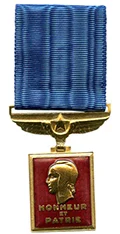
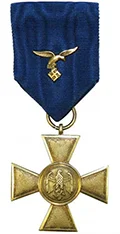
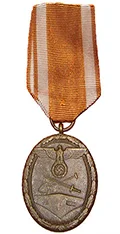
© Copyright 2025. World-War-2.org. All Rights Reserved.